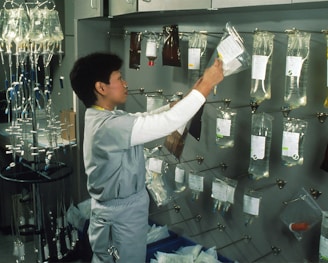

The Essential Guide to Suboxone Clinics in My Area
Introduction
Opioid addiction is a pressing public health issue that affects millions of individuals and their families worldwide. One of the most effective treatments for opioid addiction is the use of Suboxone, a medication that combines buprenorphine and naloxone. This medication helps reduce cravings and withdrawal symptoms, making it easier for individuals to overcome their addiction. Suboxone clinics play a crucial role in providing access to this life-saving treatment. If you're looking for "Suboxone clinics in my area," this guide will provide comprehensive information on what to expect, how to find the best clinics, and the benefits of Suboxone treatment.
Understanding Suboxone and Its Role in Opioid Addiction Treatment
Suboxone is a prescription medication used to treat opioid addiction. It combines two drugs: buprenorphine and naloxone. Buprenorphine is a partial opioid agonist, meaning it produces similar effects to opioids but to a much lesser degree, helping to reduce cravings and withdrawal symptoms. Naloxone is an opioid antagonist that blocks the effects of opioids and is included to prevent misuse of the medication.
How Suboxone Works
Suboxone works by attaching to the same receptors in the brain that opioids target, but it does so without producing the same high. This helps to alleviate cravings and withdrawal symptoms without the risk of severe addiction. The presence of naloxone ensures that if Suboxone is injected, it will precipitate withdrawal symptoms, discouraging misuse.
Benefits of Suboxone Treatment
Reduces Cravings and Withdrawal Symptoms: Suboxone helps manage the physical aspects of opioid addiction, making it easier for individuals to focus on their recovery.
Lower Risk of Overdose: Unlike full opioid agonists, Suboxone has a ceiling effect, which means there is a limit to the euphoria it can produce, reducing the risk of overdose.
Improved Compliance: The inclusion of naloxone helps prevent misuse, ensuring patients take the medication as prescribed.
Comprehensive Care: Suboxone treatment is often part of a comprehensive treatment plan that includes counseling and support services, addressing both the physical and psychological aspects of addiction.
Finding Suboxone Clinics in My Area
Finding the right Suboxone clinic is crucial for effective treatment. Here are some steps and tips to help you find the best Suboxone clinics in your area:
Step 1: Start with Online Research
The internet is a valuable resource for finding Suboxone clinics. Use search engines and online directories to locate clinics near you. Keywords like "Suboxone clinics in my area" can help you find local options.
Step 2: Check Credentials and Accreditation
Once you have a list of potential clinics, check their credentials and accreditation. Look for clinics that are accredited by reputable organizations such as the Joint Commission or CARF (Commission on Accreditation of Rehabilitation Facilities). Accreditation ensures that the clinic meets high standards of care.
Step 3: Read Reviews and Testimonials
Patient reviews and testimonials can provide insight into the quality of care at a clinic. Look for reviews on websites like Google, Yelp, and health-focused forums. Pay attention to both positive and negative feedback to get a balanced view.
Step 4: Evaluate the Treatment Approach
Different clinics may have different approaches to treatment. Look for clinics that offer comprehensive care, including medical treatment, counseling, and support services. This holistic approach is more effective in addressing the multifaceted nature of addiction.
Step 5: Consider Accessibility and Convenience
Consider the location and hours of operation of the clinic. A conveniently located clinic with flexible hours can make it easier to attend appointments regularly, which is crucial for successful treatment.
Step 6: Verify Insurance and Payment Options
Check if the clinic accepts your insurance and what payment options are available. Understanding the costs involved and how they can be covered is an essential part of the decision-making process.
What to Expect at a Suboxone Clinic
Understanding what to expect during your visit to a Suboxone clinic can help ease any anxiety and prepare you for the treatment process.
Initial Assessment
Your first visit will typically involve an initial assessment. This includes a comprehensive evaluation of your medical history, substance use history, and current health status. The healthcare provider will use this information to develop a personalized treatment plan.
Induction Phase
The induction phase is the first stage of Suboxone treatment. During this phase, you will begin taking Suboxone under medical supervision. The goal is to find the right dose that alleviates withdrawal symptoms and cravings without causing adverse effects.
Stabilization Phase
Once the appropriate dose is determined, you enter the stabilization phase. This involves regular follow-up appointments to monitor your progress and make any necessary adjustments to your medication.
Maintenance Phase
The maintenance phase is the long-term phase of Suboxone treatment. The focus is on maintaining stability, preventing relapse, and supporting ongoing recovery. This phase includes continued medication, counseling, and support services.
Counseling and Support Services
Counseling and support services are integral parts of Suboxone treatment. These services address the psychological and emotional aspects of addiction, helping you develop coping strategies and build a support network.
The Importance of Counseling in Suboxone Treatment
Counseling plays a vital role in the success of Suboxone treatment. It helps address the underlying issues that contribute to addiction and provides the tools needed for long-term recovery.
Types of Counseling
Individual Counseling: One-on-one sessions with a therapist provide a safe space to explore personal issues, set goals, and develop coping strategies.
Group Counseling: Group sessions offer peer support and the opportunity to learn from others who are going through similar experiences.
Family Counseling: Involving family members in the treatment process can improve communication, rebuild trust, and create a supportive home environment.
Benefits of Counseling
Addressing Root Causes: Counseling helps identify and address the underlying issues that contribute to addiction, such as trauma, stress, or mental health disorders.
Developing Coping Skills: Therapy provides tools and strategies to manage stress, cravings, and triggers effectively.
Building Support Networks: Group and family counseling help build a strong support network, which is crucial for long-term recovery.
Improving Mental Health: Addressing co-occurring mental health issues can significantly improve overall well-being and reduce the risk of relapse.
Support Services Available at Suboxone Clinics
In addition to medical treatment and counseling, many Suboxone clinics offer a range of support services designed to support long-term recovery.
Case Management
Case managers help coordinate various aspects of your care, including medical appointments, counseling sessions, and support services. They can also assist with housing, employment, and other social services.
Peer Support
Peer support groups provide a sense of community and encouragement from others who have experienced similar challenges. These groups can be an invaluable source of support and inspiration.
Educational Programs
Educational programs offer information on addiction, recovery, and healthy living. These programs can help you understand your condition better and empower you to make informed decisions about your health.
Holistic Therapies
Some clinics offer holistic therapies such as yoga, meditation, acupuncture, and art therapy. These therapies can complement traditional treatment methods and enhance overall well-being.
The Role of Family and Community in Recovery
Family and community support are critical components of successful recovery. Involving loved ones in the treatment process can provide additional motivation and encouragement.
Educating Family Members
Educating family members about addiction and recovery can help them understand the challenges you face and how they can best support you. Many clinics offer family education programs and counseling sessions.
Building a Supportive Environment
Creating a supportive home environment is crucial for long-term recovery. Encourage open communication, set healthy boundaries, and establish routines that promote stability and well-being.
Engaging with the Community
Engaging with the community through volunteer work, support groups, and social activities can provide a sense of purpose and belonging. Building a network of supportive peers and mentors can help you stay motivated and focused on your recovery goals.
Overcoming Common Challenges in Suboxone Treatment
While Suboxone treatment is highly effective, there are common challenges that patients may face. Being aware of these challenges and knowing how to address them can improve the chances of successful recovery.
Managing Side Effects
Like any medication, Suboxone can cause side effects. Common side effects include headache, nausea, constipation, and insomnia. If you experience side effects, discuss them with your healthcare provider. They can adjust your dosage or recommend strategies to manage the symptoms.
Dealing with Stigma
Stigma surrounding addiction and medication-assisted treatment can be a significant barrier to recovery. Educating yourself and others about the effectiveness and importance of Suboxone treatment can help reduce stigma. Surrounding yourself with supportive and understanding individuals can also make a difference.
Staying Motivated
Maintaining motivation throughout the treatment process can be challenging. Setting small, achievable goals and celebrating your progress can help you stay focused and motivated. Counseling and support groups can also provide encouragement and accountability.
Addressing Co-Occurring Disorders
Many individuals with opioid addiction also have co-occurring mental health disorders such as depression, anxiety, or PTSD. Integrated treatment that addresses both addiction and mental health issues is essential for long-term recovery.
The Future of Suboxone Treatment
Suboxone treatment has already transformed the lives of countless individuals struggling with opioid addiction. Ongoing research and advancements in addiction medicine continue to improve the effectiveness and accessibility of this treatment.
Advances in Medication
Researchers are continually exploring new medications and formulations to enhance the effectiveness of opioid addiction treatment. This includes developing longer-acting formulations and combination therapies that address multiple aspects of addiction.
Telemedicine and Remote Care
The rise of telemedicine has made it easier for individuals to access Suboxone treatment, particularly in areas with limited healthcare resources. Remote care options provide greater flexibility and convenience, making it easier to adhere to treatment plans.
Integrated Care Models
Integrated care models that combine medical treatment, counseling, and support services in a coordinated manner are becoming increasingly common. These models improve outcomes by addressing the physical, psychological, and social aspects of addiction in a comprehensive way.
Policy and Advocacy
Advocacy efforts continue to focus on expanding access to medication-assisted treatment, reducing stigma, and promoting evidence-based practices. Policy changes at the local, state, and federal levels can help ensure that more individuals have access to life-saving treatments like Suboxone.
Conclusion
Finding the right "Suboxone clinics in my area" is a critical step in overcoming opioid addiction and reclaiming your life. Suboxone treatment, combined with comprehensive counseling and support services, offers a path to recovery that addresses both the physical and psychological aspects of addiction. By understanding what to expect from Suboxone treatment, knowing how to find a reputable clinic, and being aware of the importance of counseling and support, you can make informed decisions that support your journey to recovery.
Opioid addiction is a complex and challenging condition, but with the right treatment and support, recovery is possible. Suboxone clinics provide a vital resource for individuals seeking to overcome addiction and build a healthier, more fulfilling life. Whether you're seeking treatment for yourself or a loved one, this guide aims to provide the information and resources needed to take the first step towards recovery. Remember, reaching out for help is a sign of strength, and with the right support, you can achieve lasting recovery and a brighter future.
